ISLAMABAD: The Asian Development Bank (ADB) on Thursday approved a $400 million loan to Pakistan to support ongoing reforms to tackle the energy crisis.
This is the second ADB loan for Pakistan in the energy sector in five months. Earlier, ADB approved a $900m loan in December for the new coal power generation unit in Jamshoro that will deliver reliable, cost effective electricity to hundreds of thousands of energy-starved households and businesses.
Separately, the Japanese government has conveyed to the government about its intention to provide $52m to support the energy sector reforms. ADB, the World Bank and Japan have worked with the government to develop a reform programme and set agreed policy targets to manage tariff and subsidy; improve sector performance and open the market to private participation; and improve accountability and transparency in the energy sector.
“The loan is part of an assistance programme which will underwrite reforms needed to make the energy sector affordable, reliable, sustainable and secure,” said ADB director general Klaus Gerhaeusser. “This in turn will accelerate industrial activity needed to boost economic growth and help create jobs, which are key to reducing poverty levels,” he said.
The full programme is expected to total $1.2 billion, with future amounts subject to further discussions between ADB and the government. For the first sub-programme, co-financing from Japan of $49m and the World Bank of $600m is expected. The full programme is due for completion by June 2018.
The government has agreed with IMF, under the extended fund facility (EFF), to reduce the energy sector’s burden on the annual state budget and its negative impact on economic growth. Based on the findings and lessons from previous interventions, the government needs support to realise and sustain the reforms set out in the power policy.
The chronic power shortage is estimated to have slowed GDP growth by at least two percentage points per year and is deemed to be the major cause of a decline in large-scale manufacturing, which grew by just 1.2 per cent in 2012 and 2.8pc in 2013.
Without reliable power, factories are not able to deliver orders on time and have lost contracts. Textile exports, which account for more than 50pc of goods export receipts, have only increased marginally since 2010. The steady deterioration of power availability has also hurt business confidence.












































Dear visitor, the comments section is undergoing an overhaul and will return soon.